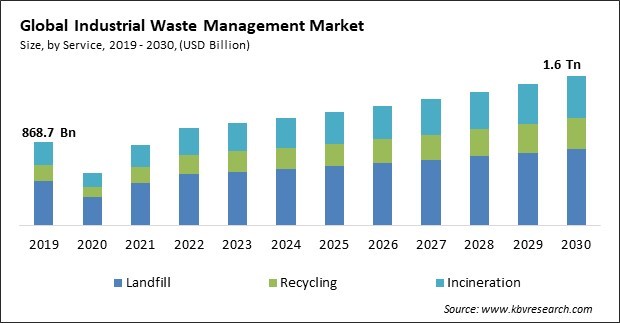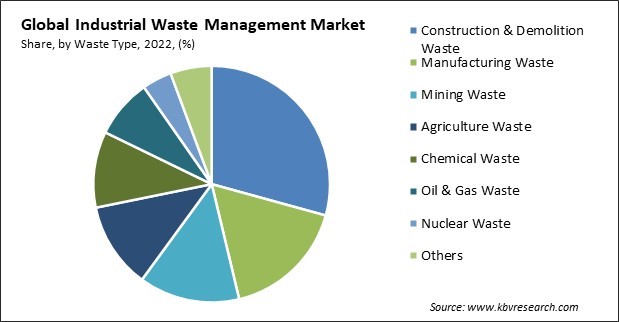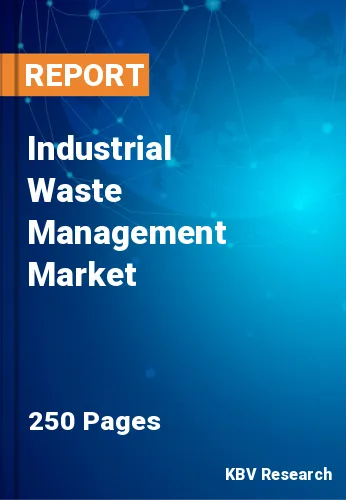The Global Industrial Waste Management Market size is expected to reach $1.6 Trillion by 2030, rising at a market growth of 5.6% CAGR during the forecast period.
Agricultural waste, particularly crop residues, and certain byproducts, can be used for bioenergy production through processes like anaerobic digestion or biomass combustion. Consequently, the agricultural waste segment would generate approximately 12.3% share of the market by 2030. Many countries have regulations governing the proper management and disposal of agricultural waste. These regulations often aim to reduce environmental impact and promote sustainable practices. Some of the factors affecting the market are sustainability and circular economy initiatives, expansion of technological advancements, and high initial capital costs.

Circular economy principles encourage industries to minimize waste generation at the source. By adopting sustainable production processes and reducing excess material use, companies can decrease the overall volume of waste, leading to a more efficient and eco-friendly industrial landscape. The concept of a circular economy promotes closed-loop systems where products are created to be recycled and reused. Sustainability and circular economy initiatives create a favorable environment for expanding the industrial waste management market. Moreover, Integration of sensors, RFID technology, and real-time monitoring systems allows for the creating smart waste management systems. These systems enable the efficient collection, tracking, and management of industrial waste, optimizing routes for waste collection trucks and reducing operational costs. Hazardous waste management requirements drive the market.
However, the substantial upfront costs can be a barrier to entry for smaller waste management companies or businesses. This can limit competition in the market and reduce options for industries seeking waste management services. High capital costs can affect the profit margins of waste management companies. Recovering these costs while remaining competitive may require higher service fees, potentially leading to increased costs for industries seeking waste management services. These aspects will decline the market growth in the coming years.
On the basis of waste type, the market is segmented into construction & demolition waste, manufacturing waste, chemical waste, mining waste, oil & gas waste, agriculture waste, nuclear waste, and others. In 2022, the construction & demolition waste segment dominated the market. Construction and demolition (C&D) waste is rendered during the construction, renovation, demolition, and deconstruction of buildings and infrastructure. It includes many materials, such as concrete, wood, metal, glass, and plastics. Construction and demolition activities contribute significantly to resource depletion. Proper waste management practices help conserve resources by promoting recycling and reuse.

Based on service, the market is fragmented into landfill, recycling, and incineration. The recycling segment covered a considerable revenue share in the market in 2022. Recycling services include the collection of recyclable materials from industrial facilities. Materials are then sorted to separate different types of recyclables. Advanced sorting technologies, including automated sorting systems and manual sorting, are employed to ensure the quality of recyclable materials. Public awareness campaigns and educational programs help inform industrial stakeholders and the public about recycling and proper waste separation. Ongoing research and development efforts focus on innovative recycling technologies, such as advanced sorting systems, chemical recycling, and new methods for processing specific types of industrial waste.
| Report Attribute | Details |
|---|---|
| Market size value in 2022 | USD 1 Trillion |
| Market size forecast in 2030 | USD 1.6 Trillion |
| Base Year | 2022 |
| Historical Period | 2019 to 2021 |
| Forecast Period | 2023 to 2030 |
| Revenue Growth Rate | CAGR of 5.6% from 2023 to 2030 |
| Number of Pages | 250 |
| Number of Table | 310 |
| Report coverage | Market Trends, Revenue Estimation and Forecast, Segmentation Analysis, Regional and Country Breakdown, Porter’s 5 Forces Analysis, Company Profiling, Companies Strategic Developments, SWOT Analysis, Winning Imperatives |
| Segments covered | Service, Waste Type, Region |
| Country scope |
|
| Companies Included | Veolia Environnement S.A., EnviroServe (Savage Companies), Covanta Holding Corp. (EQT AB (PUBL)), Waste Management, Inc., Stericycle, Inc., Daiseki Co., Ltd., Clean Harbors, Inc., Remondis SE & Co. KG, Republic Services, Inc. (Cascade Investment Group, Inc.), and Sembcorp Industries (Temasek International Pte Ltd) |
| Growth Drivers |
|
| Restraints |
|
Region-wise, the market is analysed across North America, Europe, Asia Pacific, and LAMEA. The Europe region acquired a substantial revenue share in the market in 2022. The focus on recycling and resource recovery is increasing in Europe. Industries are exploring innovative solutions to recycle industrial waste materials, reducing dependence on virgin resources and minimizing the environmental footprint. European public awareness of environmental issues is high, and consumers often expect businesses to demonstrate corporate responsibility. Companies are, therefore, integrating sustainable waste management practices into their corporate strategies to enhance their reputation and meet consumer expectations.
Free Valuable Insights: Global Industrial Waste Management Market size to reach USD 1.6 Trillion by 2030
The market research report covers the analysis of key stakeholders of the market. Key companies profiled in the report include Veolia Environnement S.A., EnviroServe (Savage Companies), Covanta Holding Corp. (EQT AB (PUBL)), Waste Management, Inc., Stericycle, Inc., Daiseki Co., Ltd., Clean Harbors, Inc., Remondis SE & Co. KG, Republic Services, Inc. (Cascade Investment Group, Inc.), and Sembcorp Industries (Temasek International Pte Ltd)
By Service
By Waste Type
By Geography
This Market size is expected to reach $1.6 Trillion by 2030.
Sustainability and circular economy initiatives are driving the Market in coming years, however, High initial capital costs restraints the growth of the Market.
Veolia Environnement S.A., EnviroServe (Savage Companies), Covanta Holding Corp. (EQT AB (PUBL)), Waste Management, Inc., Stericycle, Inc., Daiseki Co., Ltd., Clean Harbors, Inc., Remondis SE & Co. KG, Republic Services, Inc. (Cascade Investment Group, Inc.), and Sembcorp Industries (Temasek International Pte Ltd)
The expected CAGR of this Market is 5.6% from 2023 to 2030.
The Landfill segment is leading the Market, by Service in 2022, thereby achieving a market value of $798.4 billion by 2030.
The Asia Pacific region dominated the Market, by region in 2022, and would continue to be a dominant market till 2030; there by, achieving a market value of $568.2 billion by 2030.
Our team of dedicated experts can provide you with attractive expansion opportunities for your business.

